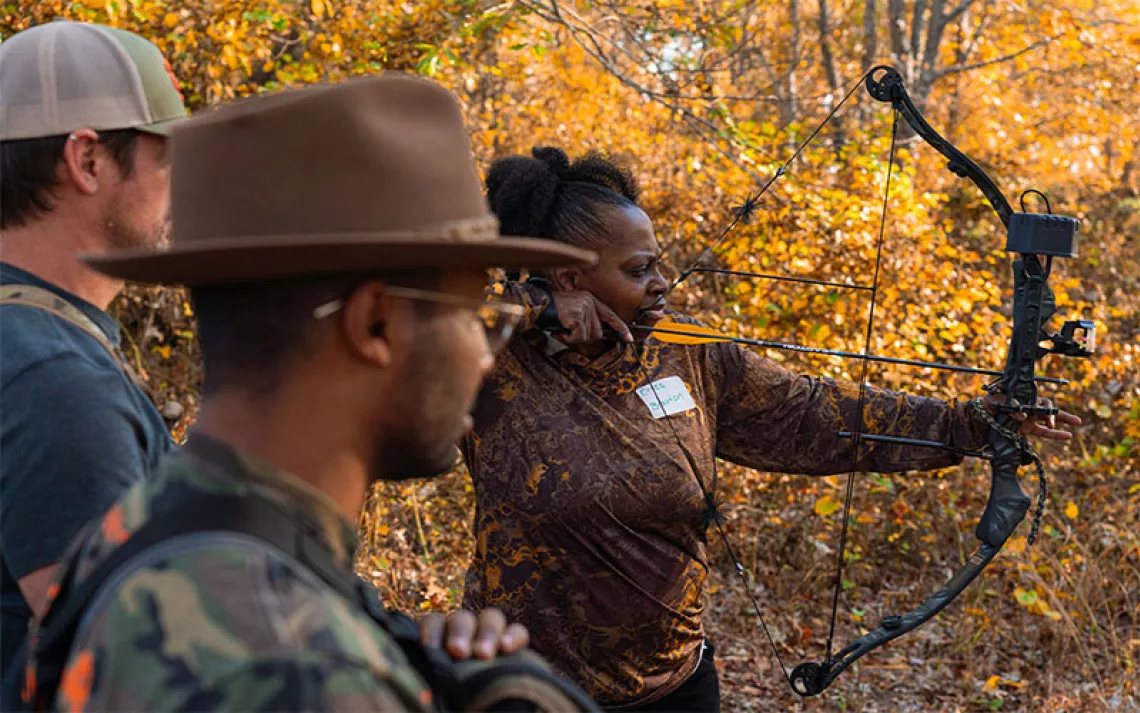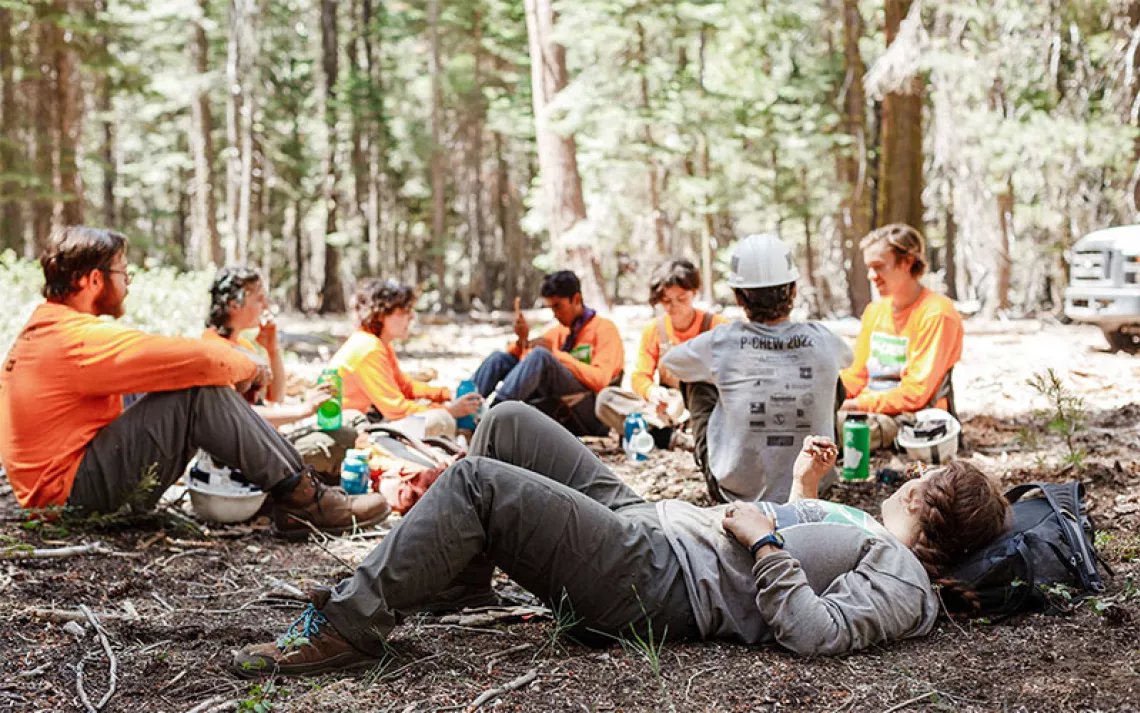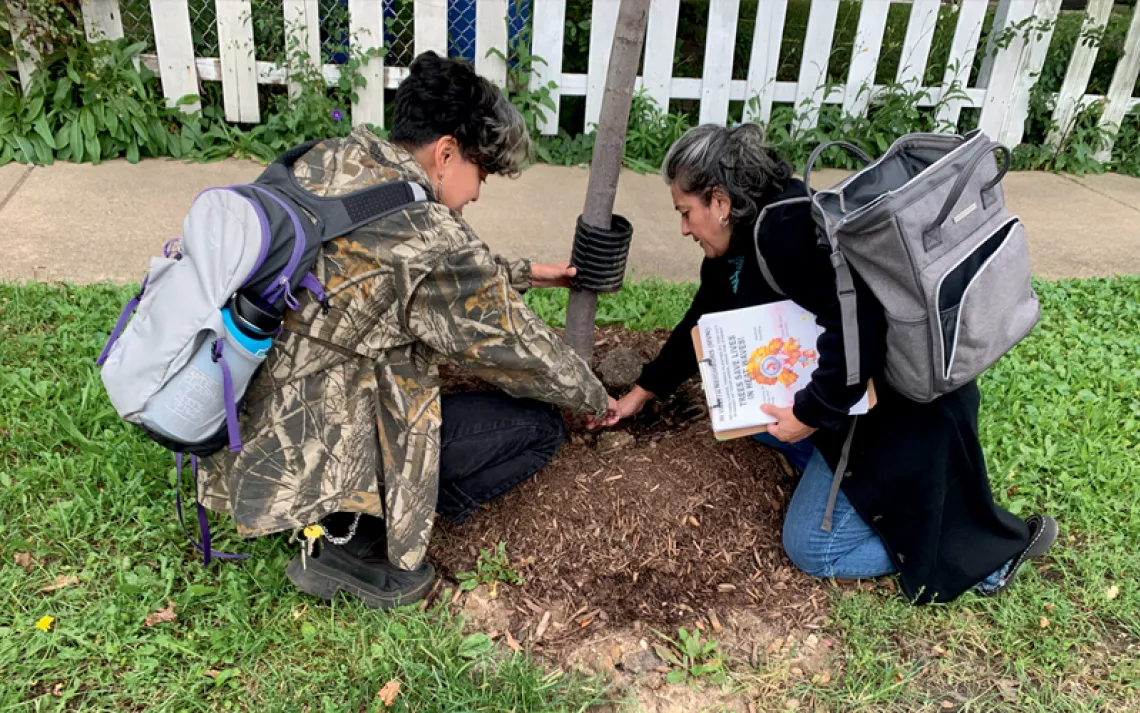ENVIRONMENT EXPLAINED
LGBTQ+ Adventurers Are All About Getting Out in the Woods
The push for diversity and respect in the outdoors must include LGBTQ+

A hiker with the Venture Out Project | Photos by Leah Nash
AMIE FREETLY WAS THE FIRST to take the plunge into the swimming hole below the Big Log Camp Bridge. Soon enough, others peeled off their clothes and joined in.
Jay Crosby, a queer, nonbinary person with breasts, asked if he could swim with his shirt off.
"It's your trip," Perry Cohen said with a nod.
Last September, 12 hikers from six states around the country set out on a four-day journey through Olympic National Park—one in a series of expeditions organized by the Venture Out Project, a nonprofit that takes lesbian, gay, bisexual, transgender, queer, and nonbinary and differently gendered people on wilderness adventures. The group, which Cohen founded, has taken around 300 hikers into the woods since 2015 and has eight trips, plus dozens of day hikes and classes, planned for this year.
At Big Log, on the second day of the trip, fallen cedars draped the riverbanks, and exposed tree roots snaked their way down mossy rocks. Everyone was quiet, in awe, until Cohen dove into the sun-dappled, freezing water and yelped.
Crosby, an illustrator, climbed onto a warm boulder with his sketchbook. "It's all so gorgeous. I don't really know how else to describe it," he said. "I just love how big everything is and how tall the trees are. I really like feeling small in the woods."
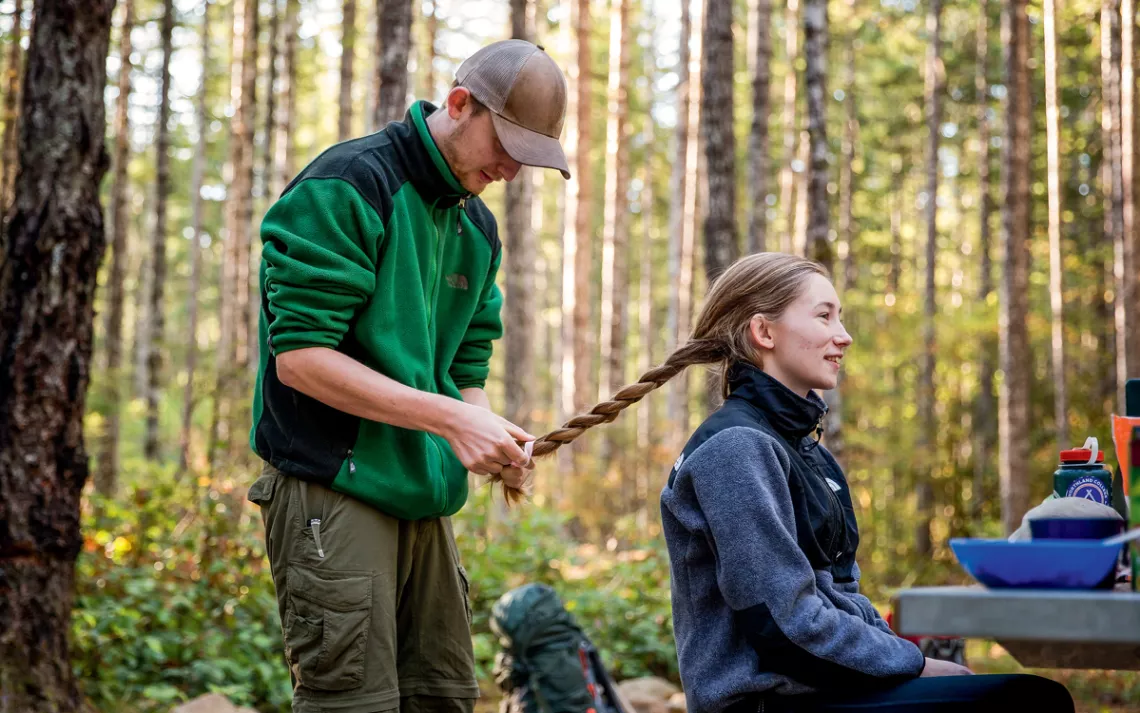
Elliot Drake-Maurer braids Courtney Carnevale's hair
In the past few years, groups like Outdoor Afro and Brothers of Climbing have exposed the lack of racial diversity in outdoor recreation. The National Park Service Comprehensive Survey of the American Public (2011) found that only one in five people who visit national parks is nonwhite; the 2016 Outdoor Participation Report, produced by the Outdoor Industry Association, found that minorities continue to lag behind whites in outdoor recreation. People of color who are also LGBTQ+ may find it even harder to access nature.
Cohen started Venture Out at age 38, shortly after he transitioned, to build a safe outdoors community for LGBTQ+ people. He envisioned trips like this one in Olympic National Park, where people could enjoy wild places without having to worry about being called the wrong pronoun or whether they squatted to pee. He also wanted to demonstrate that the push for diversity and respect for community in the outdoors must include LGBTQ+ folks.
As a transgender man, Cohen has always felt most like himself in the outdoors. Climbing mountains gave him a way to process and overcome the hate he felt for his body.
"There weren't any mirrors. There weren't any bathrooms. It was just me," Cohen said. "[Hiking] was a way of finding appreciation for a body that in a lot of ways I didn't like."
For Freetly, the trip was a long time coming. She hadn't camped seriously since 2002 and stopped hiking altogether shortly after moving to Austin, Texas. "In Texas, it's like, you pull off the side of the road. You walk a flat path to see a thing," the software developer said. "Then you walk back."
Early on in her transition, she was using a drug called spironolactone, an androgen blocker with diuretic side effects. During strenuous activity, Freetly had to ingest huge quantities of water and salt and take frequent bathroom breaks, making outdoor recreation complicated.
Then, Freetly moved to Portland. She immediately appreciated the beauty of the Pacific Northwest. After she had an orchiectomy, she was able to come off the medication. She started joining friends from work on day hikes. After getting to know Venture Out operations manager Travis Clough on weekly summer outings, Freetly agreed to the backpacking trip through Olympic National Park—her first in 15 years.
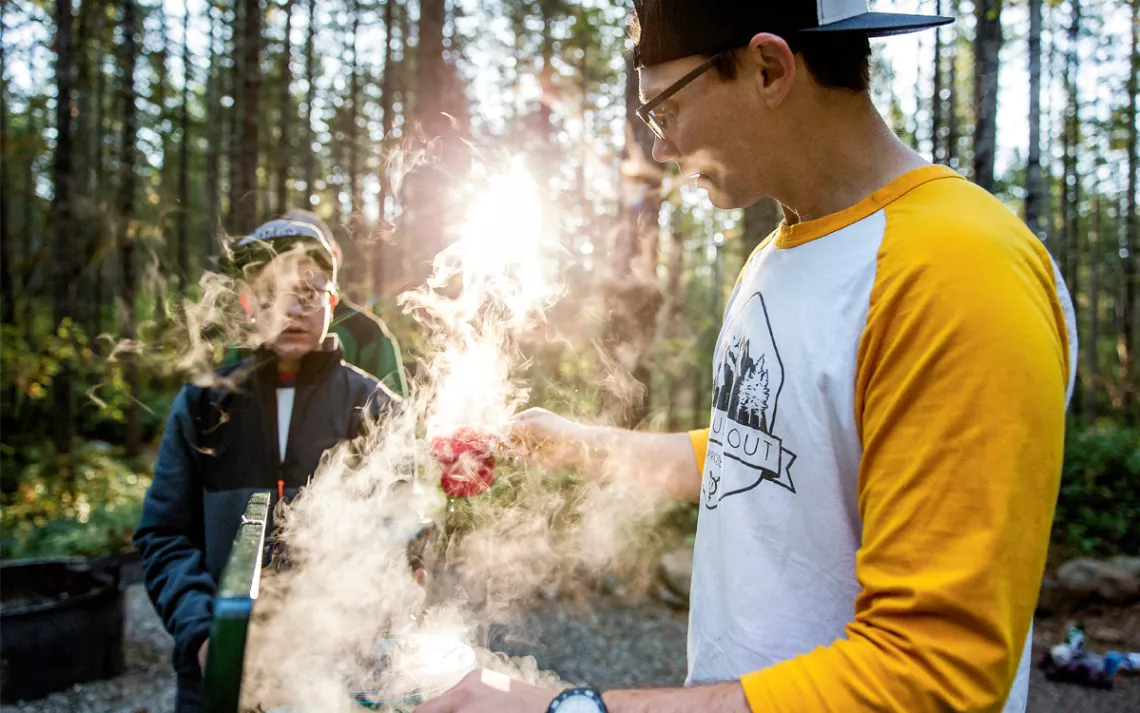
Travis Clough cooks English-muffin pizzas at the Big Creek Campground
Freetly wasn't as worried about discrimination on the trail as a handful of the transgender men who participated were. She'd had more trouble just getting gear: While shopping at REI a few years back, she said, she had tried to change her name in her membership records.
A clerk, calling Freetly by her old name, had told her she needed a court order.
ACCORDING TO KOA's 2016 North American Camper Report, same-sex households are five times more likely to camp than the general population. Adventurers connect with each other through events like Seattle's LGBTQ Outdoors Summit last fall and Portland's monthly Queer Adventure Storytelling night. What continue to draw them out into wild places, many report, are the healing benefits those places provide, allowing people to escape everyday work and life concerns or the pressures of societal judgment—or, as Cohen notes, simply giving them the opportunity to put away technology and to-do lists and connect.
Yet while many LGBTQ+ people find comfort in nature, they also struggle to access it. Some states are rich in natural wonders but poor when it comes to inclusive health care, antidiscrimination laws, and other protections.
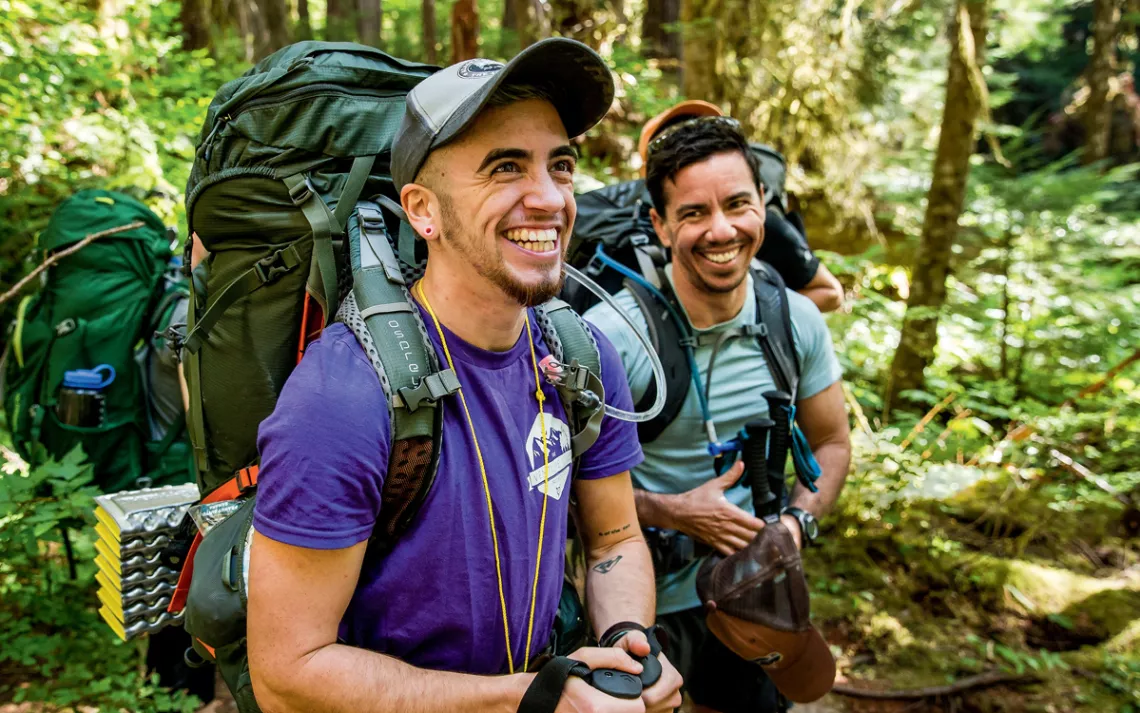
Malcolm Ribot (left) with Perry Cohen
Trans and gender-nonconforming people may feel nervous hiking sections of the Appalachian Trail, for instance. Consider North Carolina, which repealed its controversial House Bill 2, regulating trans bathroom access, but still approved a law banning cities from establishing local LGBTQ+ antidiscrimination rules.
Income disparities can also stand in the way. According to a 2016 National LGBTQ Task Force survey, trans people are four times more likely than the general population to have a household income of less than $10,000 a year. The lack of disposable income is greater for trans people of color. They face unemployment at four times the national rates.
"If you look at work that is happening and that has historically happened in the queer community, broadly defined, it ends up being divided across race as well," said Queta Gonzalez, director of the Center for Diversity & the Environment. "I'm a woman of color and I'm queer. And so I know those intersections really well. And I've always loved the outdoors. I was a poor kid who loved the outdoors. So, 'I want to be a skier! Oh, no, I can't.'"
Fear of discrimination is also a constant for many people, as Cohen can attest. Two summers ago, he took five transgender hikers on a Venture Out trip on Vermont's Long Trail. They spent nights in shelters—communal roofed structures that offer protection from the elements and leave a smaller trace on the land. They're open to the public, first come, first served.
As they approached a shelter one night, the group found a bonfire raging in a pit, a handle of vodka sitting in a backpack, and a drunken stranger staring at them, demanding answers.
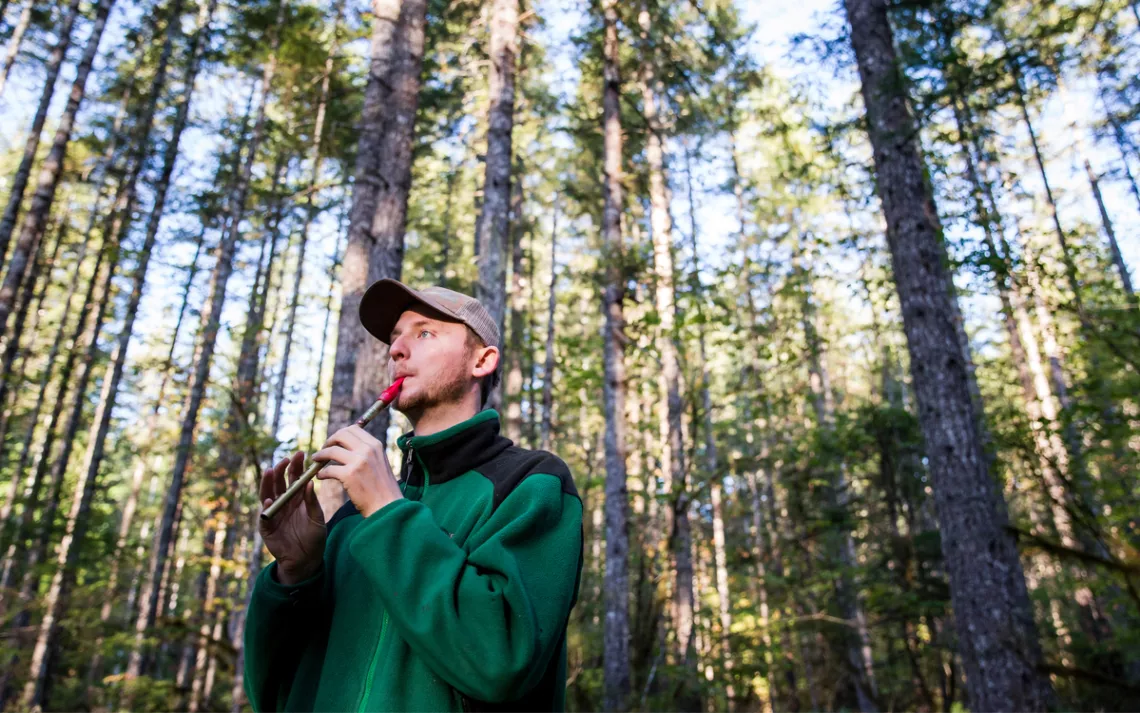
Outdoor educator Elliot Drake-Maurer plays the penny whistle at the beginning of the trip.
"There were a lot of androgynous-looking people in the group," Cohen recounted. "The man said, 'So are you a school group?' I said, 'No.' He was like, 'Are you a college group? What are you all?' I just looked at him and said, 'We're a group of grown-ass adults.'"
They left and pitched their tents on uneven ground far away that night.
Cohen still hesitates when he comes across passersby on the trail. For the trip through Olympic National Park, he told participants to say they were friends from Portland if anybody asked. "I feel torn about it," he said. "I want everyone to feel proud and safe with who they are. On the other hand, we're living in the real world, and we're out in the woods. And you never know."
One participant on the trip who preferred to remain anonymous said he would never have backpacked without Venture Out because he was afraid. He works in radio, and while he isn't closeted, he doesn't want his gender identity to be a public issue.
"Every day, I walk out the door and I'm like, 'Will I get killed today for being who I am?'" he said. "I can never quite relax. I can never quite be myself. When I use a public bathroom, I'm always on guard."
He said he didn't like sleeping in tents until the Venture Out trip. "I now know why people freak out about camping and talk so highly about it," he said. "It didn't seem fun to me. I felt unsafe. And now a lightbulb has gone off, like, 'Oh wow, that is really amazing. I wish I could've had this my whole life.'"
THE HIKERS SETTLED IN AT Camp Pleasant after a dinner of hot dogs, baked beans, and jalapeño corn cakes fried on a WhisperLite stove. It was just after 8:30 P.M.; a tent glowed under the stars. Earlier, outdoor educator Elliot Drake-Maurer had played the penny whistle. The melody had long faded, and the campers' chatter had quieted enough to hear the rush of water. Moss dripped from the towering trees.
Campers with the Venture Out Project
Someone almost stepped on a banana slug on the trail. A crowd squatted around it, talking about how cute the slug was and making poop jokes. Ethan Wilson, who had driven 35 hours from his hometown in Indiana for the trip, commented that he had never seen a banana slug before. Drake-Maurer explained that the slug was hermaphroditic: While mating, one or the other in a pair may become pregnant. They can even impregnate themselves.
"Nature is home," Drake-Maurer said. "It's a home we've left behind, thinking that life was better outside of it. When you're in the city, you're still breathing the same air and drinking the same water that's coming from somewhere that's green and wet and flowing and living—like this place."
Drake-Maurer blends in with many in the backcountry. At outdoor conferences, he sees a lot of tall white men with beards wearing Patagonia jackets. Because he isn't often read as gay, he feels freer than others to enjoy the outdoors. If anything, he's more self-conscious about his stutter.
"It's important to be an out and visible queer educator, but I just don't want to be like, 'Hi, kids. My name's Elliot. I'm your gay teacher,'" he said. "Some parents say, 'Ah! Gays! Run away!' That makes people less likely to come to your camp. But if you just never mention the fact that you are queer, you have to wonder about that lonely LGBTQ student who's thinking, 'Wow. Nobody here is like me.'"
While cisgender gay men dominate many LGBTQ+ communities, most participants in Venture Out are trans and/or nonbinary. Cohen and Clough, who is also transgender, explicitly reach out to those as well as the broader LGBTQ+ communities, including friends who have become "internet trans famous."
One of the campers, Malcolm Ribot, was a Girl Scout as a child. But sometimes he wishes he could've done Boy Scouts instead. At 28, his sashes are long gone. The closest he ever got to his scouting ideal was through Venture Out. He got to learn about map-reading and survival, and to bond with other hikers without the gender stereotypes. He even got a patch at the end of a trip.
Ribot, who documented his transition on YouTube for a few years, is somewhat of a celebrity in the transgender community. He has traveled cross-country to organize meet-ups for trans men in every state except Hawaii. Fans have stopped him in coffee shops and airports.
His celebrity has led to a need for solitude. These days, he likes silence. Road trips with the radio off and long hikes with his dog help him recharge.

Sign up to receive Sierra News & Views
Get articles like this one sent directly to your inbox weekly.
With this action you affirm you want to receive Sierra Club communications and may vote on policy designated by the Sierra Club Board.
"Nature doesn't judge you. You can go outside and be whoever you are," Ribot said. "It's where I feel most at home and where I feel most at peace."
IN 2014, THE NATIONAL PARK SERVICE announced a study as part of its LGBTQ Heritage Initiative. The next year, a support group for LGBTQ NPS employees was created; it has since grown to a few hundred members. In 2016, the Interior Department affirmed that visitors to national parks can use restrooms that align with their gender identity.
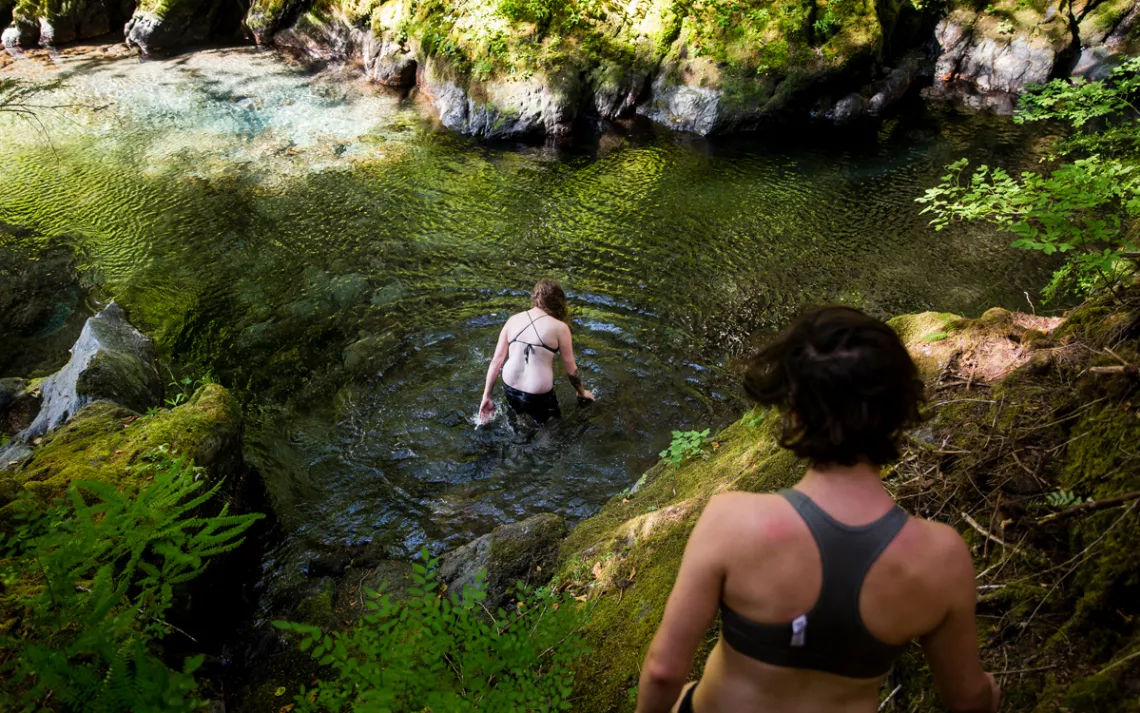
Swimming hole in Olympic National Park
While groups like Venture Out are getting LGBTQ+ people out in the woods, more needs to be done to provide equal access to equal services, for everybody. Outdoor retailers could better interact with LGBTQ+ people by learning the right language to use and paying attention to what makes them uncomfortable. Parks could consider gender-neutral changing rooms and bathrooms and place gender-neutral language on forms and descriptions of programs.
Many of the Olympic National Park hikers were excited when they didn't have to explain their transition every time it came up. Trans men traded their hysterectomy stories without judgment. It felt good to squat in the woods and not shock people who didn't expect men to pee that way.
Even Clough felt like he could "just exist" on the trip.
"When I'm in a group of queer people in the woods, I get to exist without any sort of explanation about my age or my gender or why my voice might be kind of high," Clough said. "And maybe you're a person who does pass all the time. People aren't necessarily harassing you out in the world. But then, you're also kind of invisible. You sometimes lose that sense, too, of who you are."
"A lot of the time in queer spaces, the main thing that you have in common is, 'Oh, we're all queer,'" Crosby added. "But out here, I knew that the main thing we'd have in common—other than being queer—is that we all love backpacking and being outside."
Crosby joined the Venture Out trip after Ribot posted about it on Facebook. The next thing he knew, they were sharing a tent. When Ribot and another tentmate discovered they had the same head lamp, they flipped through the different settings—the strobe, the red light, the red strobe. Giggles punctuated the night from their tent.
"All of us didn't get the opportunity to do the kind of camps that we wanted to do as kids," Crosby said. "So, being able to come back as an adult and camp in a tent with your friends, and just have that sense of community and silliness and fun, is really valuable.
This article appeared in the March/April 2018 edition with the headline "Out in the Woods."
This article was funded by Sierra Club Outdoors.
MORE
Watch a video of Venture Out hikers on the trail.
OUTDOORS FOR ALL
LGBTQ+ accessibility to outdoor recreation fits into a larger movement for greater diversity in the outdoors. On top of its LGBTQ+ Employee Resource Group, the National Park Service also hosts groups that cater to women, African Americans, Latinos, and Native Americans. Here's what other organizations are doing.
Greening Youth Foundation
This nonprofit provides education and opportunities in conservation work for youths across the country. The director of programs, Eboni Preston, said the foundation approaches students at historically black and tribal colleges because organizations must deliberately reach out to underrepresented groups, rather than assume they'll come on their own.
Camber Outdoors
Camber Outdoors promotes women's leadership in the outdoors industry through webinars, networking initiatives, and events such as Camber Exchange. Over 180 corporations support the organization. Executive director Deanne Buck said the outdoors should belong to everyone, and we all need to work to make that a reality.
Adventures for Hopi
Adventures for Hopi focuses on recreation access and "education through direct experience" for youths. "Diversification is important to be able to share a space with people who don't share the same world views as you," program director Marshall Masayesva said. "And to be able to share that across a campfire or sitting in a boat [is eye-opening]."
Access Ability Wisconsin
Many disability organizations are regional, rather than national. Access Ability Wisconsin helps people in the Badger State access all-terrain outdoor wheelchairs. "People with disabilities have diverse backgrounds, too. We're actually a growing minority population," the group's president, Monica Kamal, said.
Center for Diversity & the Environment
The center offers organizational support, leadership programs, and training to help improve diversity in the environmental movement. It has served over 800 organizations since 2008. "We lead with race and ethnicity," director Queta Gonzalez said. "Because basically all other 'isms' are grounded in that."
 The Magazine of The Sierra Club
The Magazine of The Sierra Club

